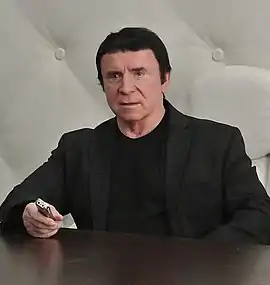Anatoly Kashpirovsky
Anatoly Mikhailovich (Mikhaylovich) Kashpirovsky (Ukrainian: Анатолій Михайлович Кашпіровський, Russian: Анато́лий Миха́йлович Кашпиро́вский, born 1939) is a Russian psychotherapist of Ukrainian origin who claims to be a hypnotist and a psychic healer. He enjoyed great popularity in the Soviet Union in the 1980s, including work with the Soviet Olympic weight lifting team. In 1989, as the USSR was crumbling, he made a series of broadcasts on Soviet television in which he attempted mass hypnosis at the behest of the government in an effort to subdue the populace. [1] Around 2010 he was again performing mass healing rituals in front of large audiences, although he never returned to his former popularity.[2]
Anatoly Kashpirovsky | |
|---|---|
 | |
| Born | Anatoliy Mikhailovich Kashpirovskiy 11 August 1939 |
| Alma mater | Vinnytsia National Medical University |
| Occupation | Psychotherapist |
| Website | www.kashpirovskiy.com |
Biography
Born in Khmelnytskyi, Ukraine, USSR, Kashpirovsky graduated from the Vinnytsia Medical Institute in 1962. After this, he worked for 25 years as a psychiatrist in a psychiatric hospital.
He became famous in 1989 after several of his sessions with patients were shown on Soviet television. Among other things, he was shown to allegedly remove the pain of two patients who remained conscious during abdominal surgery by addressing them by teleconferencing.[3] The first session was shown on 9 October 1989 on the Central Channel of the USSR. The sessions also called for a restored faith in the government and Communism, in an effort to hypnotize viewers into rallying behind the Soviet cause.[1]
In 1993 he was elected to be a Deputy of the Russian Duma.
References
- "The Soviet Union's Desperate Efforts at Mind Control". Retrieved April 7, 2023..
- "The Shadow of Doctor Kashpirovsky" (in Russian). Archived from the original on March 23, 2010. Retrieved March 26, 2010.
- "Фрагмент из книги "Формула огня" | Анатолий Кашпировский". Kashpirovskiy.com. Archived from the original on 2012-04-23. Retrieved 2012-08-02.